You’re not alone if Autonotes isn’t quite meeting your practice’s needs. Many mental health professionals find themselves searching for alternatives that better align with mental health workflows, pricing structures, or integration requirements.
The right AI powered note taking tool can transform your documentation process from a tedious burden into an efficient system. However, choosing poorly can lead to frustration, wasted time, and compromised note quality.
This guide examines the top alternatives specifically through the lens of mental health practice. You’ll discover specialized AI tools built for mental health professionals, general medical scribes that work well for therapy, and key factors to consider when making your decision.
What to Look for in Autonotes Alternatives
Finding the right alternatives requires evaluating AI tools against specific criteria that directly impact your daily practice.
HIPAA Compliance and Data Security
Every alternative must meet HIPAA compliance standards with end-to-end encryption and secure data storage. Verify BAAs (Business Associate Agreements) are standard practice, not optional add-ons.
Mental Health Specialization vs General Medical Focus
Mental health-specific AI powered tools understand therapy workflows, treatment plans, and progress notes tracking differently than general medical scribes. Look for platforms built by healthcare professionals who understand your documentation needs.
EHR Integration Capabilities
Seamless integration saves significant time compared to manual methods. Some alternatives offer direct EHR connections with one-click transfers, while others require copy-paste workflows that add extra steps to your documentation process.
Pricing Structure and Value Proposition
Compare session-based pricing versus unlimited notes models. Consider your monthly volume - heavy users benefit from unlimited plans starting around $69-99/month, while lighter users might prefer per-session options around $29/month.
Note Quality and Customization Options
Evaluate how well alternatives capture therapeutic nuances, treatment modalities, and clinical documentation language. Look for customizable templates matching your preferred note types (SOAP notes, DAP notes, narrative).
Learning Curve and User Experience
Consider setup time, training requirements, and daily workflow integration. The best alternative should feel intuitive within your first few sessions, not require extensive customization.
Top Mental Health-Focused Alternatives
When evaluating alternatives, mental health-focused platforms offer significant advantages over general medical AI documentation tools. These specialized tools understand therapy workflows, use appropriate clinical notes language, and integrate seamlessly with mental health EHRs.
Supanote - Built Exclusively for Mental Health
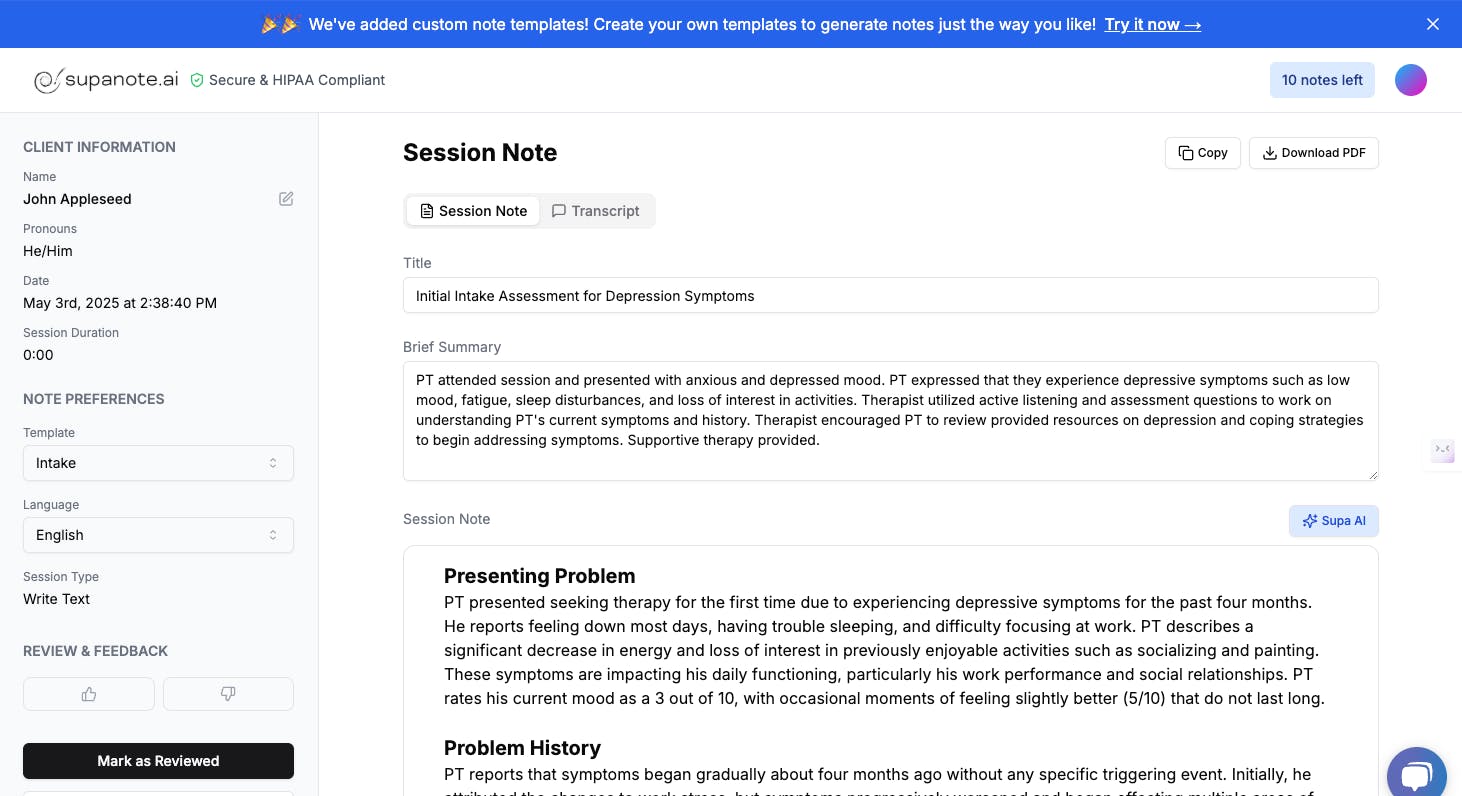
Supanote is built exclusively for mental health professionals—with native EHR autofill, deep personalization, and a simple interface that just works.
- Native EHR integration with the signature “Super Fill” button that transfers notes directly into your EHR system
- Advanced AI system that learns your writing style and clinical preferences over time
- Clean, intuitive interface designed specifically for mental health workflows
- Responsive customer support with real humans who understand mental health practice needs
- Regular feature updates based on direct therapist feedback
Pricing: Starting at $19.99/month billed annually for 40 notes, with unlimited notes at $69.99/month billed annually
Best suited for: Solo practitioner therapists and small groups seeking seamless EHR integration with personalized note generation
Mentalyc - Established Mental Health Solution
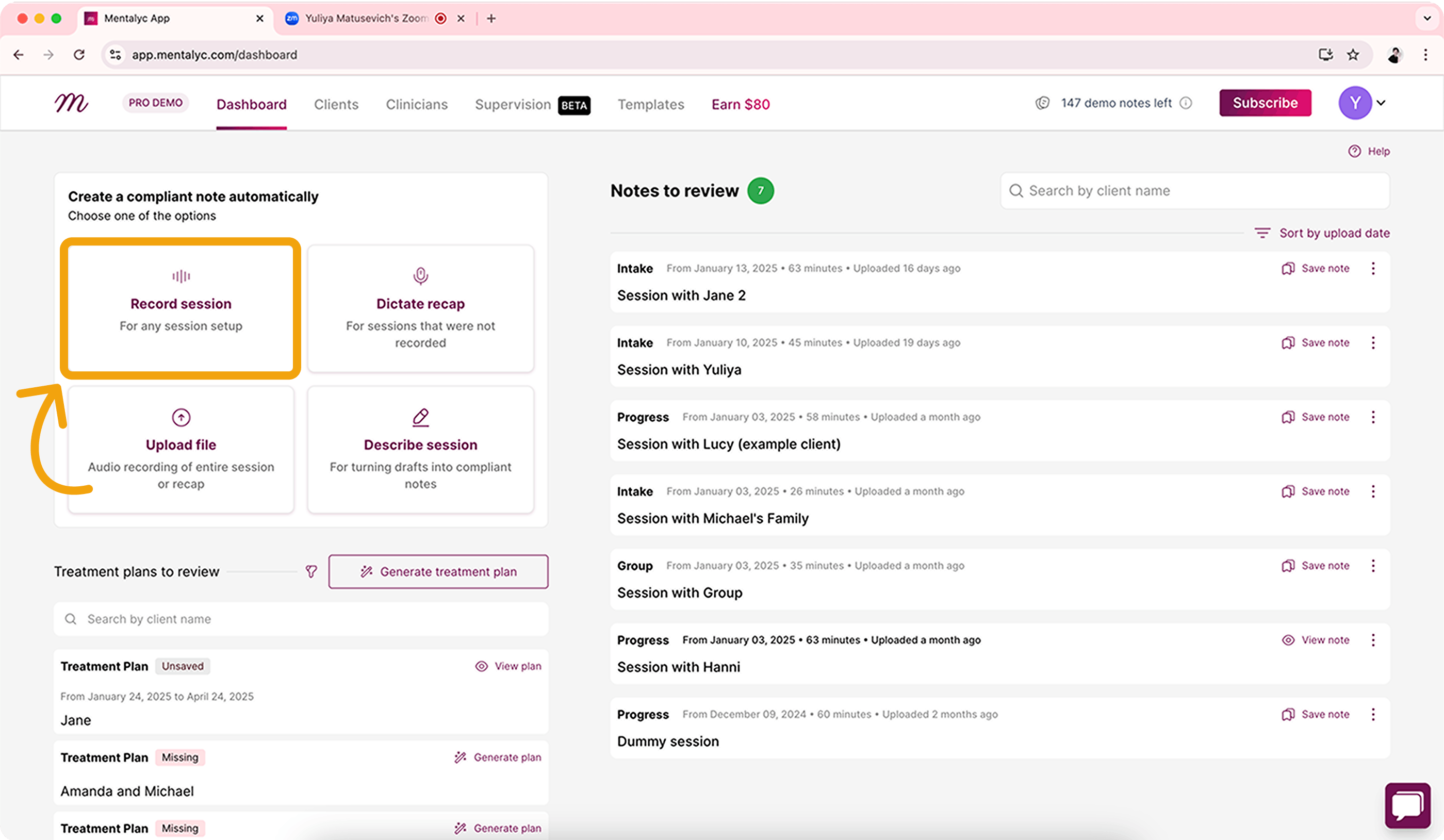
Mentalyc has built a solid reputation in the therapy community as one of the first AI note taking tools designed specifically for mental health professionals.
- SOAP notes and DAP notes templates optimized for various therapy modalities.
- Extensive workflow customization options to match your documentation style
- Team plans with collaboration features for group practices
- Copy-paste functionality for EHR systems without direct integration
- Established track record with thousands of therapist users
- Regular webinars and training resources for optimal platform use
Pricing: Starting at $19.99/month for 40 notes, unlimited notes at $69.99/month
Best suited for: Group practices and therapists who prefer established platforms with proven track records and team collaboration features
Upheal
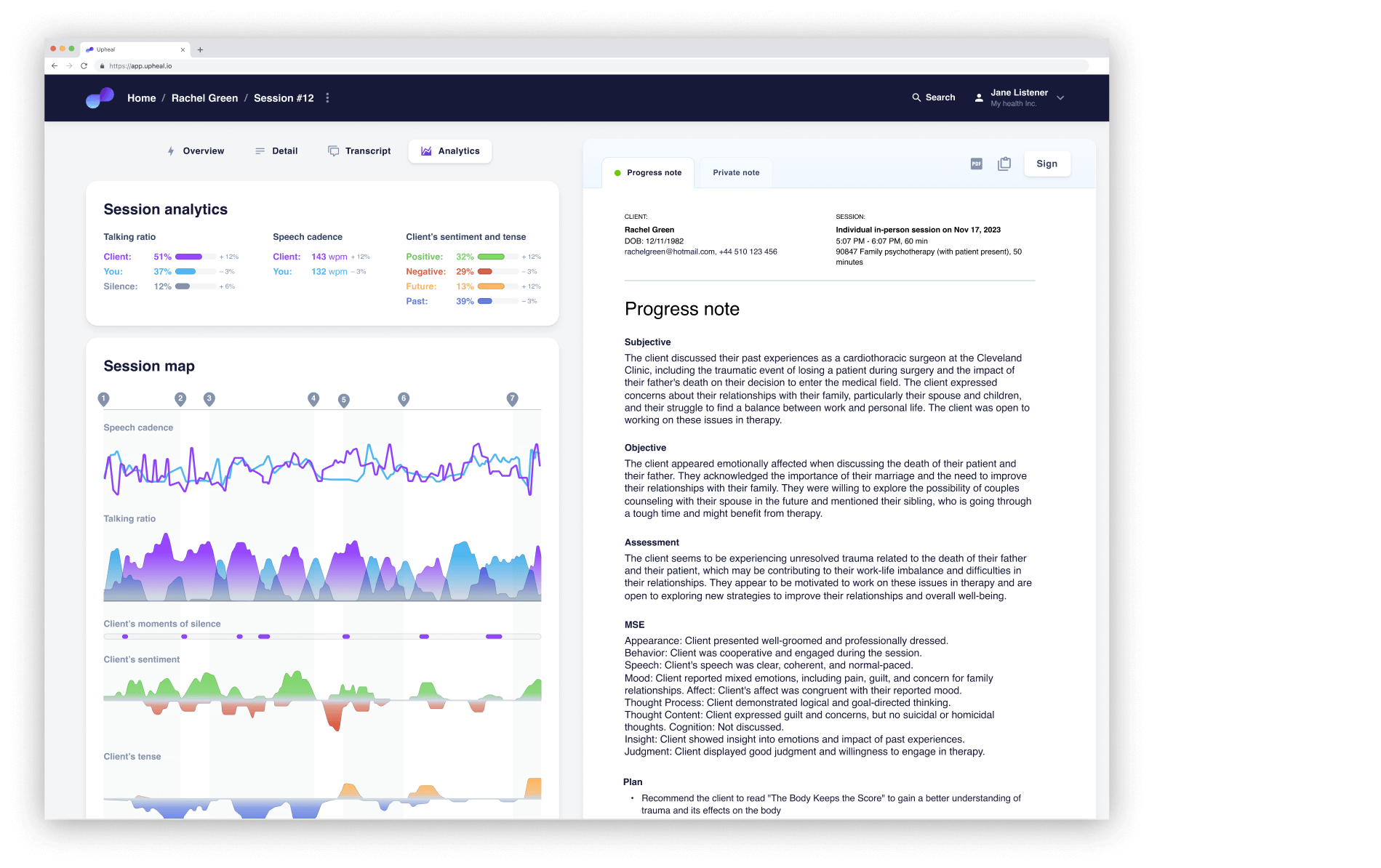
Upheal combines AI note generation with built-in telehealth tools, offering a complete platform for therapists who want scheduling, sessions, and documentation in one place.
- Free access to unlimited notes with basic note generation capabilities and no time restrictions.
- Built-in session analysis providing AI powered insights into client progress notes and therapeutic patterns
- Advanced real time transcription accuracy with mental health terminology recognition for therapy sessions
- Progressive pricing structure allowing gradual feature adoption for healthcare professionals
Pricing: Free unlimited notes with basic note generation, premium features from $19/month
Best suited for: New practitioners, budget-conscious mental health professionals, and those wanting to explore AI documentation tools without financial commitment
Blueprint
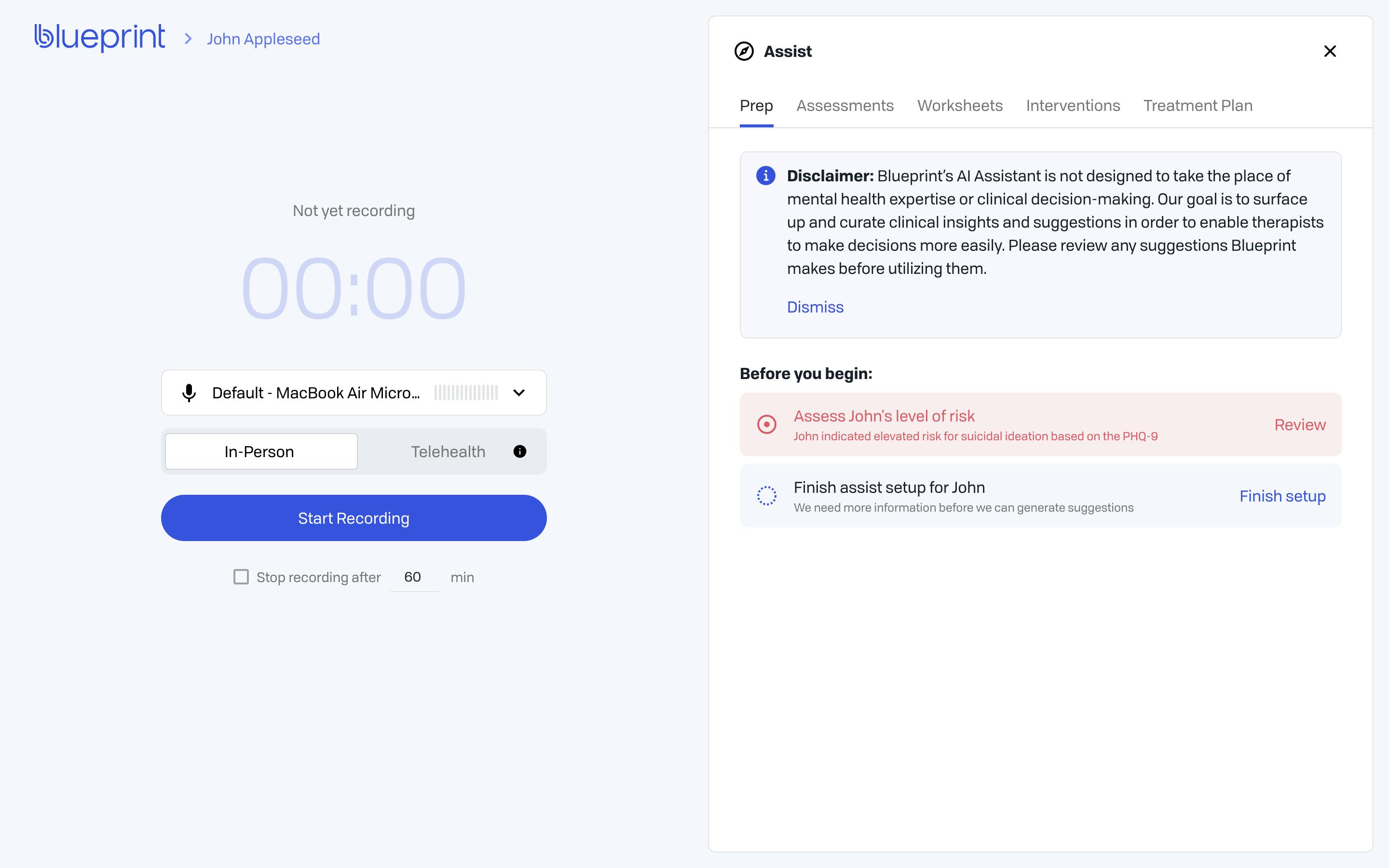
Blueprint offers a unique pay-per-session approach that can be cost-effective for mental health professionals with variable caseloads or part-time practices.
- Flexible payment structure based on actual usage rather than monthly subscriptions for clinical notes
- Blueprint 2.0 features enhanced AI powered capabilities with improved accuracy for progress notes
- Mental health-specific custom templates covering various therapeutic approaches and note types
- No long-term contracts or commitment requirements for healthcare providers
- Ideal for solo practitioner schedules with fluctuating client loads
Pricing: Starting at $29/month with session-based scaling
Best suited for: Part-time therapists, those with seasonal practices, or professionals preferring usage-based pricing over fixed monthly fees for clinical documentation
Key Differentiators Among These Alternatives
Each platform addresses different aspects of mental health documentation and note creation:
- Integration focus: Supanote leads with native EHR connections, while Mentalyc relies on copy-paste workflows for session notes
- Cost accessibility: Upheal’s free plan provides the lowest barrier to entry for AI tools
- Pricing flexibility: Blueprint’s session-based model suits variable practices and solo practitioner needs
- Team features: Mentalyc offers the most robust collaboration tools for group practices using AI powered systems
When choosing among these autonotes alternatives, consider your specific documentation needs. Solo practitioner setups may prefer Supanote’s personalization features, while group practices might benefit from Mentalyc’s team collaboration tools for clinical notes. If you’re budget-conscious or new to AI documentation tools, Upheal’s free plan provides an excellent starting point for progress notes creation.
All four platforms understand mental health terminology and workflows better than general medical AI tools, making them superior choices for therapy practices seeking specialized note taking solutions.
While mental health documentation tools often provide the best fit, several general medical AI scribes offer compelling features that can work effectively for therapy practices.

General Medical AI Tools
Freed.ai
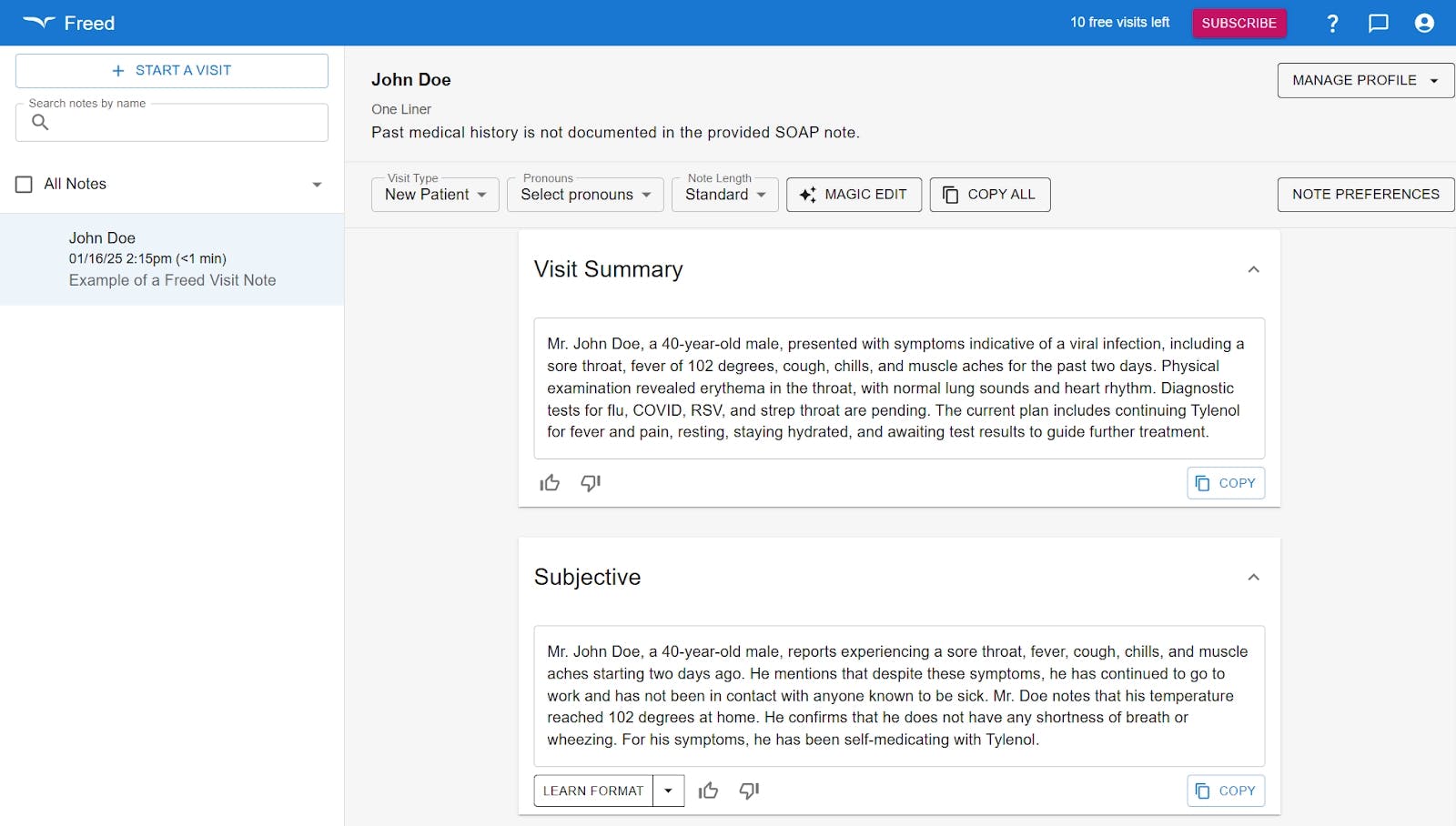
Freed.ai positions itself as an unlimited solution across all medical specialties, making it attractive for multi-disciplinary practices or mental health professionals who need high-volume note generation.
- No session limits once you’re on the monthly plan
- Works across all medical specialties including mental health
- Group pricing drops to $84/month for teams of 2-9 users
- 10 free visits let you test the platform before committing
- May lack mental health-specific templates and workflow optimizations
Pricing: $99/month (unlimited), Group pricing at $84/month for 2-9 users
Best suited for: High-volume practices or multi-disciplinary clinics needing unlimited documentation
Heidi Health
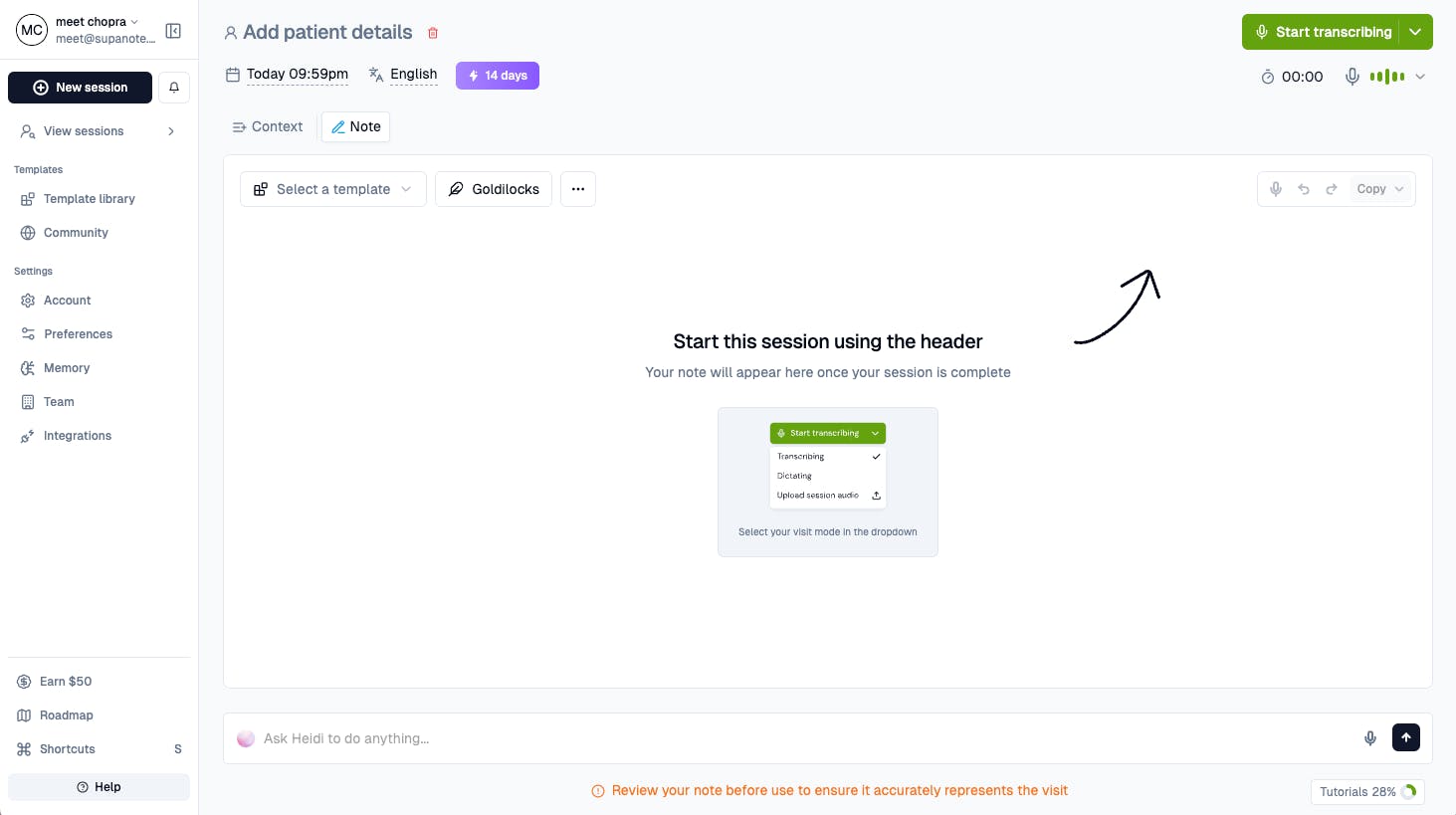
Heidi Health stands out for its international reach and free plan, making it particularly valuable for healthcare professionals working with diverse populations or those wanting to test AI documentation tools extensively.
- Robust free plan includes 10 Pro Actions monthly
- Multilingual support across 50+ countries
- Three-tier pricing structure accommodates different practice sizes
- 33% annual discount on Pro plan makes it cost-effective
- General medical focus means less therapy-specific optimization
- International compliance and data security standards
Pricing: Free plan available, Basic at $39/month, Pro at $99/month
Best suited for: International practices, multilingual therapy sessions, or healthcare providers wanting extensive free testing
Twofold AI
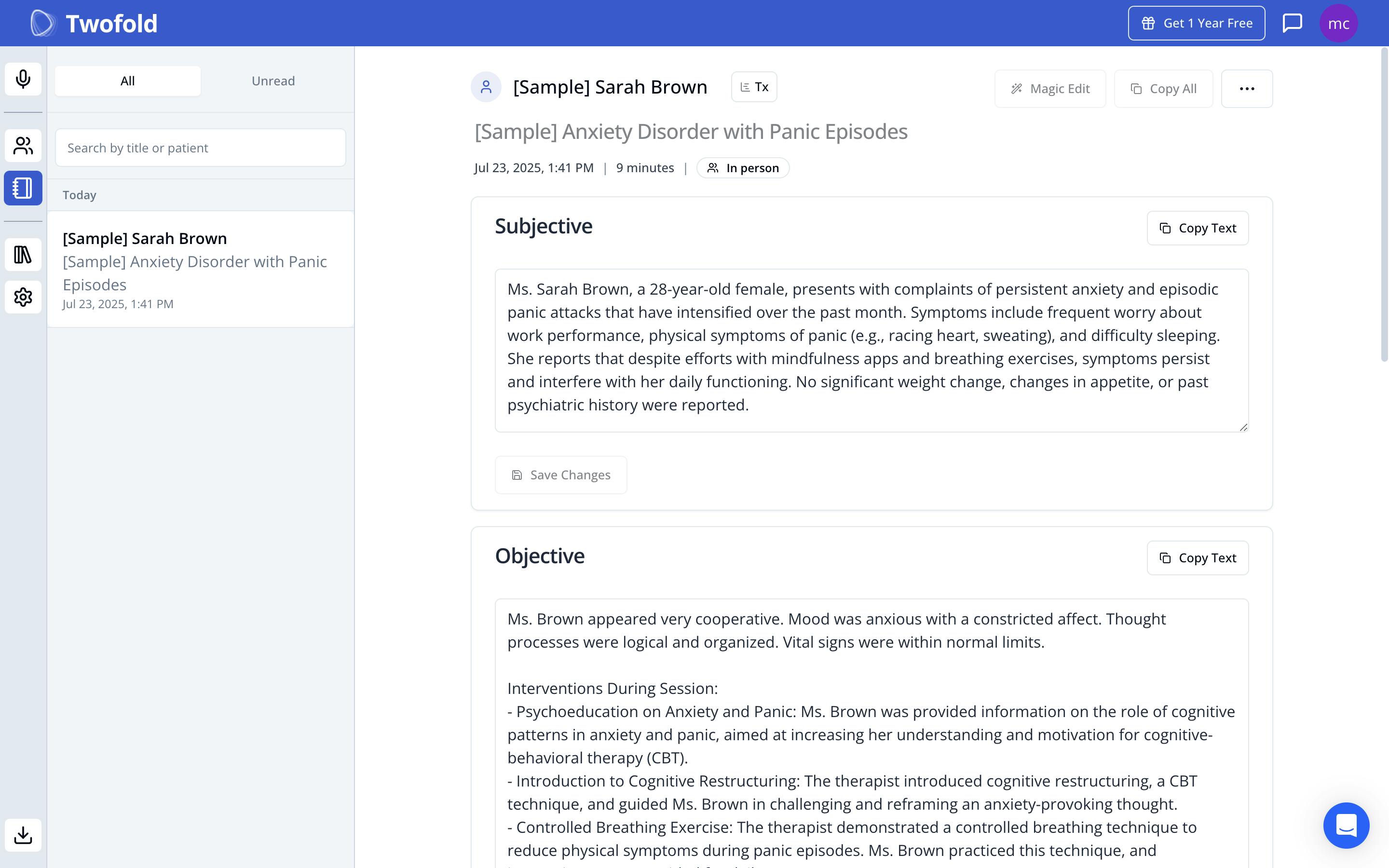
Twofold AI emphasizes accuracy and performance, appealing to mental health professionals who prioritize note quality over mental health-specific features.
- 20 free clinical notes monthly provide substantial testing opportunity
- Personal paid plans offer unlimited notes at a competitive price point
- Strong accuracy claims backed by performance data
- Simple pricing structure without complex tiers
- Less specialized for mental health workflows and terminology
- May require more manual editing for therapy-specific language
Pricing: 20 free clinical notes/month, Personal plan at $49/month for unlimited notes
Best suited for: Accuracy-focused healthcare providers comfortable adapting general medical ai tools to therapy workflows
Key Considerations for General Medical AI Tools
General medical AI scribes often excel in technical capabilities and competitive pricing. However, they typically require more adaptation for mental health use.
You’ll likely need to:
- Customize templates manually for therapy-specific documentation needs
- Train the AI system on your preferred terminology and documentation style
- Adapt workflows designed for medical appointments to therapy sessions
- Potentially sacrifice some efficiency compared to mental health-focused autonotes alternatives
These AI tools work best when you prioritize unlimited usage, international support, or specific technical features over out-of-the-box mental health optimization. They’re particularly valuable for practices that blend therapy with other healthcare services or mental health professionals comfortable with some additional setup time.
Before choosing a general medical tool, consider whether the cost savings or specific features justify the additional customization effort compared to purpose-built mental health alternatives.
Specialized and Niche Options
Beyond the mainstream autonotes alternatives, two specialized platforms offer unique approaches that might fit specific practice needs.
Quill Therapy Notes - Summary-Based Approach
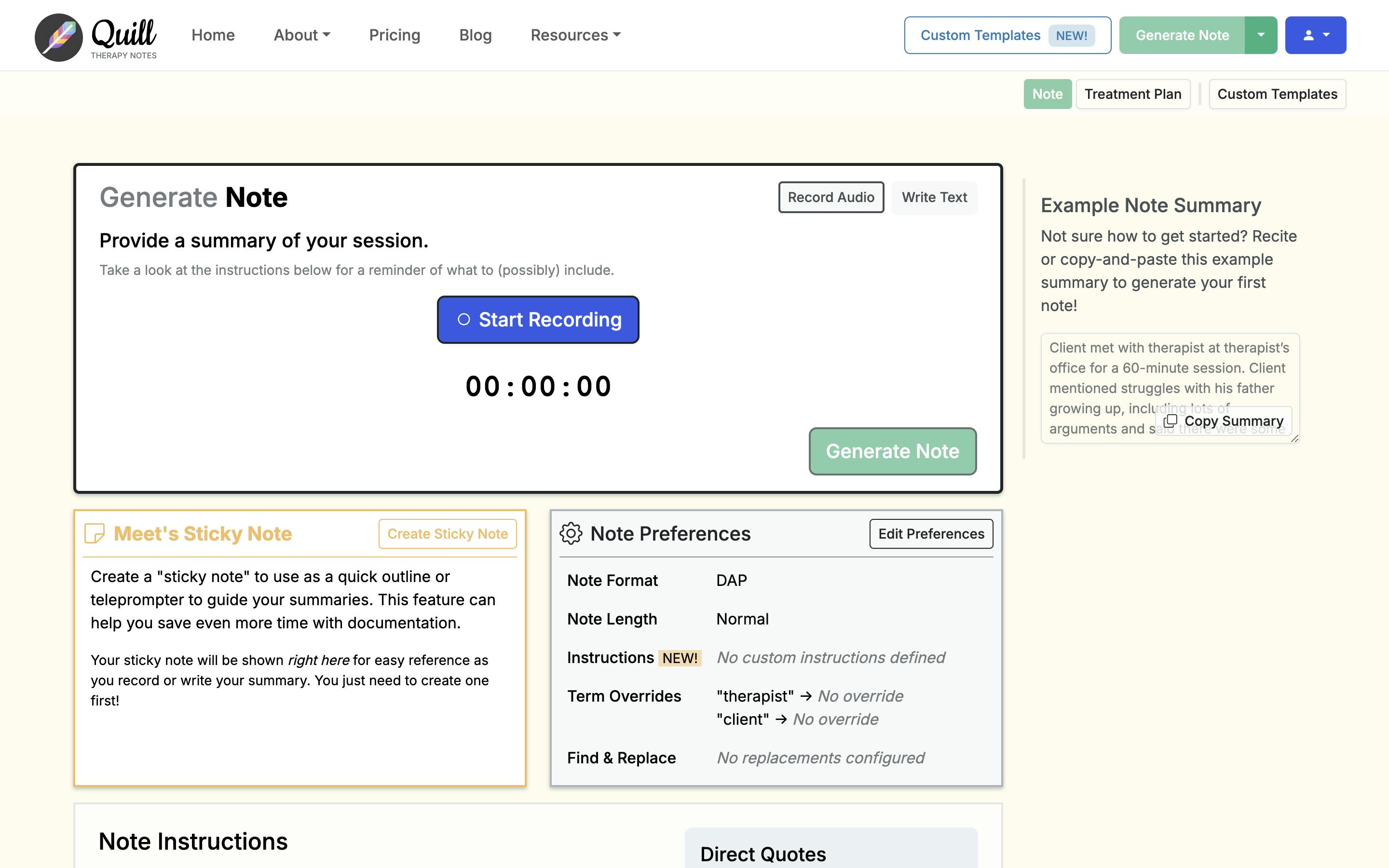
Quill takes a different route by eliminating session recordings entirely. Instead of transcribing live sessions, you simply write or dictate a brief summary of what happened, and their AI system expands it into comprehensive clinical notes.
- No audio recording required - addresses privacy concerns some clients have about session recordings
- Simple workflow: summary input transforms into detailed progress notes
- Unlimited note generation without session caps
- Clean, straightforward interface designed specifically for mental health
Pricing: $20/month for unlimited notes
Best suited for: Healthcare professionals uncomfortable with session recordings or working with clients who prefer no audio capture
Berries - Real Time Transcription Focus

Berries specializes in live session transcription and real time transcription analysis, making it ideal for mental health professionals who want immediate insights during sessions.
- Live transcription appears as you speak - useful for reviewing key details mid-session
- Multilingual capabilities support diverse client populations
- Real time transcription processing means clinical notes are ready immediately after sessions
- Strong focus on accuracy during live conversations
- Frequent promotional pricing makes the premium cost more accessible
Pricing: $99/month with regular promotional discounts
Best suited for: Healthcare providers who value real time transcription feedback and work with multilingual clients
Why Consider Niche Options
These specialized AI powered tools solve specific pain points that mainstream Autonotes alternatives might miss. Quill’s no-recording approach appeals to privacy-conscious practices, while Berries’ real time transcription suits healthcare professionals who want immediate session insights.
Both offer focused solutions rather than trying to serve all medical specialties.
Comprehensive Comparison of Autonotes Alternatives
Here’s how the leading AI note-taking tools stack up in terms of pricing and ideal use cases for mental health professionals:
Tool | Starting Price | Best For |
|---|---|---|
Supanote | $19.99/mo billed annually (Free plan available) | Mental health practices needing native EHR integration |
Mentalyc | $20/month | Therapists wanting SOAP/DAP templates and team collaboration |
Upheal | Free (unlimited basic notes) | Practices seeking comprehensive session analysis with free tier |
Blueprint | $29/month | Session-based billing preferences with auto-upgrade features |
Freed.ai | $99/month | Unlimited notes across all medical specialties |
Heidi Health | $39/month | International practices needing multilingual support |
Twofold AI | $49/month | Accuracy-focused practitioners with moderate volume needs |
Quill Therapy Notes | $20/month | Therapists preferring summary-based workflow without recording |
Berries | $99/month | Real-time session transcription and multilingual capabilities |
This comparison highlights the significant variation in pricing models and specialization levels, with mental health-focused tools generally offering more competitive pricing and relevant features for therapy practices.
Making the Right Choice for Your Practice
With so many autonotes alternatives available, choosing the right AI documentation tool requires a systematic evaluation approach that aligns with your specific documentation needs.
Start with Practice Type Alignment
Mental health professionals benefit from mental health-focused tools like Supanote, Mentalyc, and Upheal which typically offer better customizable templates and therapeutic language than general medical scribes. If you primarily conduct therapy sessions, prioritize AI powered platforms built specifically for our field over broad medical solutions.
Calculate True Costs Beyond Monthly Fees
Don’t just compare base pricing when evaluating AI tools. Factor in setup time, training hours, and potential workflow disruptions that could create a steeper learning curve. A free plan that requires extensive customization may cost more time compared to a paid plans solution that works immediately.
Test Integration Requirements Early
If you use an EHR, verify how progress notes transfer between systems during your documentation process. Supanote’s native EHR integration with their Super Fill button eliminates copy-paste steps, while other platforms may require manual transfers that add daily friction to clinical documentation.
Leverage Free Trials Strategically
Most AI powered tools offer testing periods through their free plan or trial options. Use this time to test with actual session recordings rather than demo content. Upheal’s permanent free plan lets you evaluate basic note generation without time pressure.
Consider Team Adoption Factors
If you have multiple healthcare providers, choose platforms with intuitive interfaces and strong support. AI tools with steep learning curves can derail implementation, regardless of their feature set. Factor in training time and ongoing technical support quality when making your final decision.
Frequently Asked Questions
Q: How do I know if a general medical AI scribe will work for progress notes?
A: Test the AI powered tool with actual therapy session content during free trials. Look for how well it handles therapeutic language, treatment plans terminology, and mental health documentation requirements. If clinical notes require extensive editing to sound professionally appropriate, consider a mental health-focused alternative instead.
Q: What’s the most important factor when switching from Autonotes?
A: HIPAA compliance should be your non-negotiable baseline requirement for any AI documentation tools. After that, evaluate how well the platform integrates with your existing EHR system. Poor integration can create more administrative tasks than it saves, regardless of note quality for your clinical needs.
Q: Are free plan options actually useful for practicing mental health professionals?
A: Free plan tiers work well for solo practitioner setups or testing purposes. However, most include significant limitations on note types or features. Calculate your actual monthly session volume and compare it to free plan limits before relying on them long-term for unlimited notes.
Q: How long does it typically take to switch to a new AI note taking platform?
A: Plan for 2-4 weeks to fully transition to new AI tools. This includes setting up integrations, customizing templates to match your style, and becoming comfortable with the new workflow. Start your switch during a lighter caseload period if possible to maintain consistency.
Q: Should I prioritize lower pricing or mental health specialization?
A: Mental health specialization in AI powered systems typically saves more time and produces better note quality than generic tools, even at higher paid plans pricing. Calculate the value of time saved on editing and reformatting clinical notes when comparing costs. A $20 difference monthly is minimal compared to hours of additional documentation work.
Q: Can I use multiple AI note taking tools simultaneously?
A: While technically possible, this approach creates workflow confusion and increases costs without clear benefits. Choose one primary documentation tool and stick with it for at least 30 days to fairly evaluate its performance. Multiple AI tools also complicate HIPAA compliance tracking and data security.
Q: What happens to my data if I want to switch platforms again?
A: Most reputable healthcare providers allow data export, but formats and ease of transfer vary significantly. Before committing, ask about data portability and retention policies. Some platforms delete session recordings after account closure, while others provide extended access periods with robust security measures.
Q: Do AI note taking tools work well for group therapy sessions?
A: This varies significantly by platform and their customization options. Mental health-focused AI powered tools like Supanote and Mentalyc typically handle group dynamics better than general medical scribes. Test group session scenarios specifically during trials, as this is often where generic tools struggle most with note generation.
Conclusion
Choosing the right autonotes alternatives comes down to matching your specific practice needs with each AI powered tool’s strengths. Mental health professionals benefit most from platforms like Supanote, Mentalyc, and Upheal that offer better workflow integration and therapeutic language understanding for clinical documentation.
Don’t rush this decision—your documentation tool affects daily productivity and patient care quality. Take advantage of free trials to test how each platform handles your actual session notes and progress notes creation.
For mental health professionals seeking to simplify progress note creation with seamless EHR integration, Supanote’s native integration and therapist-focused design make it a natural progression from Autonotes. The platform delivers detailed and insightful documentation while maintaining the structured notes format you need for effective client care.


